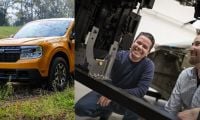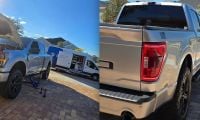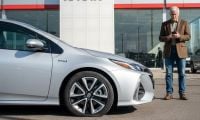A recent Consumer Reports analysis of older used cars states, "There's no reason for any car buyer to have to settle for an unreliable or dangerous vehicle just because their budget is tight. Many models that were smart choices when they were new still have those same good qualities years later as older, much less expensive used cars."
Consumer Reports analysts found that even models listed used for $5,000 or less can still be a good budget buy based on reliability data from their Annual Auto Surveys of CR members.
Related article: The Cheapest Cars in America Can Be Found by Looking at Transaction Prices—A New Update on the Least Expensive New Cars Recommended by Consumer Reports
Price, Reliability, and Safety
However, there's more to the list than just great pricing and proven reliability: safety.
For example, imagine you're driving on a wet road and have to swerve suddenly to avoid an obstacle. If your car starts to skid, only a relatively modern safety feature may be the only thing between driving home safely and winding up in an ambulance on your way to the ER.
The Electronic Stability Control (ESC) is a safety feature in modern vehicles designed to help drivers maintain control during extreme steering maneuvers, such as skidding or swerving, especially in slippery or emergency conditions.
ESC works by detecting the skid through sensors and applying brakes to specific wheels to help keep the car on course.
ESC is like a digital co-pilot that steps in when you lose control, helping you regain stability and avoid a crash.
How ESC Works:
- Sensors Monitor Vehicle Behavior: ESC uses sensors to monitor wheel speed, steering angle, yaw (rotation around the vertical axis), and lateral acceleration.
- Detects Loss of Control: If the system detects that the car is not moving in the direction the driver is steering (e.g., understeer or oversteer), it interprets this as a potential loss of control.
- Applies Brakes Selectively: ESC can automatically apply brakes to individual wheels to help correct the vehicle's direction.
- Reduces Engine Power (if necessary): In some situations, ESC also reduces engine power to help the driver regain control.
The proven benefits of ESC in modern cars is that it:
- Reduces the risk of spinouts and rollovers.
- Enhances safety during cornering or sudden maneuvers.
- Significantly reduce single-vehicle crashes and fatalities.
In many countries, including the United States and the European Union, ESC has been legally required on new cars since approximately 2012 due to its effectiveness in preventing accidents.
Best Used Cars and SUVs for Less Than $5,000
That said, here is a summary of CR's updated listing of models that can be had for under $5,000, ranging in model years from 2002 to 2012, that includes those with Electronic Stability Control (ESC).
Furthermore, an additional listing of other used models you may be considering is provided courtesy of Consumer Reports, detailing whether ESC is optional or not at all.
SMALL CARS
Mazda 3 2012 model
Price Range: $4,175 - $6,550
Owner Reported MPG: 30 mpg
SUVs
Honda Pilot 2004 and 2006 models
Price Range: $4,725 - $5,425
Owner Reported MPG: 19 mpg
Nissan Rogue 2012 model
Price Range: $4,650 - $5,450
Owner Reported Mpg: 24 mpg
Toyota Highlander 2001 and 2004 models
Price Range: $4,950 - $5,575
Owner Reported MPG: 20 mpg
Models With Optional ESC
According to Consumer Reports: "All of these sedans, hatchbacks, and SUVs were available with ESC in the model years listed, either as an option or standard on certain trim levels."
- Honda Accord 2003-2008
- Honda Civic 2007, 2010-2012
- Honda Insight 2010
- Toyota Avalon 2000, 2003
- Toyota Camry 2001-2006
- Toyota Corolla 2003-2006
- Toyota Matrix 2006-2007
- Toyota Prius 2004-2006
- Toyota Sienna 2004
Models Without ESC
- Lexus ES 2004-2005
- Toyota Tacoma 2001-2004
- Toyota Tundra 2000-2003
For additional news related to Consumer Reports research on new car shopping, be sure to check out these two recent articles:
- Consumer Reports Best New Hybrid SUVs That Cost $35,000 to $45,000
- Consumer Reports Best Deals on 10 Fuel-Efficient Cars and SUVs
COMING UP NEXT: Best of the 2025 New-Car Deals for the 4th of July Holiday Recommended by Consumer Reports
Timothy Boyer is an automotive reporter based in Cincinnati who currently researches and restores older vehicles with engine modifications for improved performance. He also reports on modern cars (including EVs) with a focus on DIY mechanics, buying and using tools, and other related topical automotive repair news. Follow Tim on Twitter at @TimBoyerWrites as well as on Facebook and his automotive blog "Zen and the Art of DIY Car Repair" for useful daily news and topics related to new and used cars and trucks.
Image Source: Deposit Photos












